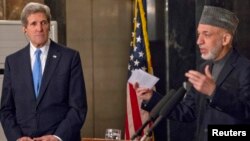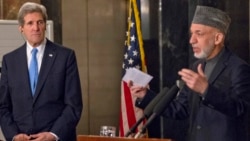“The United States is committed to an enduring partnership with the Afghan people as they seek a secure and democratic nation,” said U.S. Secretary of State John Kerry on a recent trip to Afghanistan.
Today, Afghanistan is in the midst of managing political, security, and economic transitions.
Afghan security forces are growing stronger and more capable day by day. This kind of progress will allow the U.S. and coalition troops to transition past the 2014 mission of training and advising. These security gains need to be matched by free, fair, and transparent presidential elections as well as by political progress and transformation, said Secretary Kerry. The international community will do its part to help elections to meet these standards.
“It is our hope,” said Secretary Kerry, “that this election is going to be a unifying moment for Afghanistan, and that it will represent. . .the crowning achievement of [President Karzai’s] vision for Afghanistan when he peacefully transfers power to a newly elected president.”
In addition, the U.S. continues to support an Afghan-led peace process, recognizing that reconciliation is the best way to end violence and secure a unified and a sovereign Afghanistan. The United States joins President Karzai in calling on the Taliban to take the steps necessary to open an office in Doha for discussions with the High Peace Council that could advance this process.
A successful economic transition in Afghanistan will ensure that the security and the political transition can both succeed. Reforms are necessary in order to integrate the Afghan economy with the broader region’s economy. Tremendous progress has already been made. In the last decade the gross domestic product of Afghanistan has nearly quintupled. Life expectancy is up 50 percent, and access to electricity has tripled.
Each day, Afghanistan is moving closer towards self-governance, self-determination, and self-reliance, while undermining the violent extremists who offer nothing to compare with what has been achieved over the past decade.
Today, Afghanistan is in the midst of managing political, security, and economic transitions.
Afghan security forces are growing stronger and more capable day by day. This kind of progress will allow the U.S. and coalition troops to transition past the 2014 mission of training and advising. These security gains need to be matched by free, fair, and transparent presidential elections as well as by political progress and transformation, said Secretary Kerry. The international community will do its part to help elections to meet these standards.
“It is our hope,” said Secretary Kerry, “that this election is going to be a unifying moment for Afghanistan, and that it will represent. . .the crowning achievement of [President Karzai’s] vision for Afghanistan when he peacefully transfers power to a newly elected president.”
In addition, the U.S. continues to support an Afghan-led peace process, recognizing that reconciliation is the best way to end violence and secure a unified and a sovereign Afghanistan. The United States joins President Karzai in calling on the Taliban to take the steps necessary to open an office in Doha for discussions with the High Peace Council that could advance this process.
A successful economic transition in Afghanistan will ensure that the security and the political transition can both succeed. Reforms are necessary in order to integrate the Afghan economy with the broader region’s economy. Tremendous progress has already been made. In the last decade the gross domestic product of Afghanistan has nearly quintupled. Life expectancy is up 50 percent, and access to electricity has tripled.
Each day, Afghanistan is moving closer towards self-governance, self-determination, and self-reliance, while undermining the violent extremists who offer nothing to compare with what has been achieved over the past decade.






